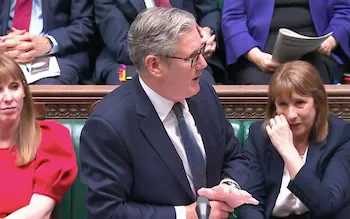Just a day after Rachel Reeves’ emotional breakdown in Parliament, the Chancellor put on a brave face as she attended the launch of a new NHS plan in London.
Flanked by Prime Minister Keir Starmer and Health Secretary Wes Streeting, Reeves smiled for the cameras, seemingly determined to project strength and stability.
But behind the public appearance, many couldn’t help but wonder what was really going on beneath the surface.
Reeves made no mention of the previous day’s drama, and while she appeared upbeat, some attendees looked on with cautious skepticism.
Starmer’s Embrace and the Fallout from PMQs
As the event unfolded, Keir Starmer offered Reeves a rather awkward hug—a gesture that, while likely intended to show support, only highlighted the tension between them.
Streeting, on the other hand, praised Reeves enthusiastically, calling her a “tough cookie” who’s made difficult but necessary decisions for the economy.
Behind the scenes, however, speculation continued.
Starmer tried to shut down rumors of political tension, insisting that Reeves’ tears were caused by “purely personal” matters.
In a radio interview, he said he hadn’t even noticed she was crying during PMQs because he was focused on answering questions—despite Kemi Badenoch’s remark about Reeves looking “miserable.”
Emotional Breakdown or Political Meltdown?
The emotional episode came after a string of challenging moments for Reeves.
Reports suggest she had just been reprimanded by Speaker Lindsay Hoyle for giving long-winded answers in Treasury questions.
Reeves reportedly told colleagues she was feeling immense pressure, with an alleged £30–£40 billion black hole in the public finances weighing on her shoulders.
Things only got worse when Starmer failed to publicly guarantee her position as Chancellor through to the next election.
That apparent lack of reassurance triggered a visible emotional response—tears, trembling lips, and eventually, her quiet exit from the chamber.
Mixed Messages from Labour’s Top Team
While Downing Street and Labour’s press team were quick to dismiss talk of a political row, whispers of internal disagreements swirled.
One insider claimed Reeves had already been upset following an argument with Angela Rayner about the government’s retreat on welfare reforms.
However, Rayner’s camp flatly denied the claim, calling it nonsense.
Still, Reeves’ emotional state sparked debate across the political landscape.
Some MPs viewed her as overwhelmed, while others defended her as a competent, burdened leader trying to navigate one of the toughest economic portfolios in government.
“We’re All Human” – Starmer’s Take on the Drama
In a bid to calm the storm, Starmer went on a media blitz, repeatedly emphasizing that Reeves’ tears were not linked to Labour’s policy U-turns or party tensions.
“We’re all human,” he reminded listeners.
“Sometimes things catch us off guard.”
He also doubled down on their joint commitment to Labour’s fiscal rules, insisting both he and Reeves remain united in their economic approach.
“She’s not just a colleague—she’s a friend,” he said.
Market Reactions and Rising Pressure
As the Commons drama unfolded, markets were clearly spooked.
Gilt interest rates surged and the pound briefly dropped in value, raising fears about instability within the new Labour government.
But by morning, markets had calmed slightly, and Labour aides rushed to reaffirm confidence in Reeves.
Her spokesperson remained tight-lipped, calling it a “personal matter,” and confirming only that she would be working from Downing Street that afternoon.
Benefits Row Exposes Rifts and Weaknesses
Adding to the turmoil was Labour’s dramatic U-turn on benefits policy.
After initially pushing for cuts expected to save £5 billion, Starmer performed a last-minute reversal, instead agreeing to a revised plan that would now cost £100 million more than the original system.
Critics accused the government of “humiliating” policy failures, with MPs like Kemi Badenoch labeling Reeves a “human shield” for Starmer’s indecision.
Despite that, the Prime Minister’s spokesperson insisted Reeves had his full backing.
Rebellion, Resentment, and a Fractured Labour Party
The chaos triggered a surge in discontent among Labour MPs. More than 40 supported a fatal amendment that would kill off Starmer’s original benefits reform package.
Although the amendment failed, it signaled growing rebellion within the ranks.
Rebel leader Rachael Maskell called for a £24 billion wealth tax and urged the party to shift leftward.
Speculation swirled that Angela Rayner, Deputy PM, may be positioning herself as a potential successor to Starmer, despite her lighthearted denial on ITV’s Lorraine show.
Starmer’s Shaky Standing and Polling Blowback
Sir Keir, approaching his first anniversary as Prime Minister, now faces a serious leadership challenge.
Polling guru Professor Sir John Curtice described Starmer’s first year as one of the worst starts for a new PM in recent memory.
He warned that the public still doesn’t know what Starmer truly stands for.
As criticism mounted, Rayner came to his defense, pointing out the immense pressures he’s faced and the global diplomacy he’s juggled, including negotiating trade deals and addressing international economic threats.
Can Reeves Regain Control of the Narrative?
Despite the emotional scenes and political turbulence, Reeves remains Chancellor for now.
But with a widening public finance gap, wavering confidence in Labour’s direction, and rebellious MPs emboldened, she has a mountain to climb.
The Autumn Budget looms large, and both Reeves and Starmer will need to find a way to stabilize their messaging, reassure financial markets, and rally their party—all while proving to the public that Labour remains a government in control.
What’s Next for Labour Leadership?
In the wake of the political firestorm, Labour’s top brass insist they’re united. But the cracks are clear.
The Prime Minister is battling internal strife, shaky market reactions, and a perception crisis.
All eyes will be on Rachel Reeves and Keir Starmer in the coming weeks—because while they may claim to be in lockstep, the pressure of leadership is only just beginning to show.
